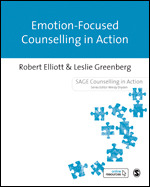Emotion-Focused Counselling in Action
- Robert Elliott - University of Strathclyde, UK, University of Toledo, USA, Auburn University, Montgomery, USA
- Leslie Greenberg - York University, Toronto, Canada
Counselling in Action series
This is the definitive introduction to the theory and practice of emotion-focused counselling. Starting with an introduction to the main theory and concepts, it then guides you through the counselling phases from beginning to end. The final chapter extends your learning by examining different client populations, process research, and ways of monitoring your practice.
Chapters include features such as case studies and transcripts, further reading sections and reflective exercises that help you to enhance your understanding of the approach.









